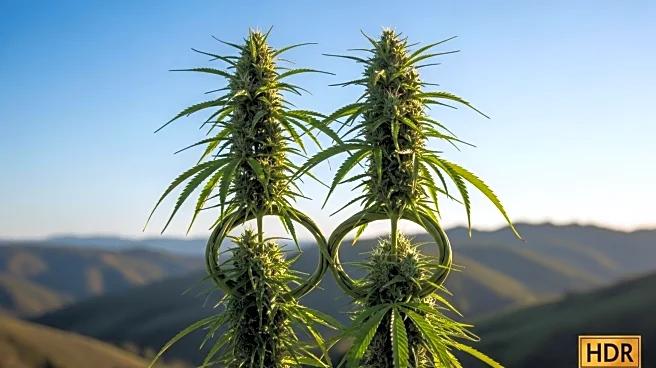What's Happening?
Cornbread Hemp, a Kentucky-based hemp company, has filed a lawsuit against the state of Tennessee, contesting new hemp regulations set to be implemented on January 1. The company argues that Tennessee's three-tier regulatory system, which mirrors the state's alcohol distribution rules, discriminates against out-of-state businesses. This system requires hemp companies to either partner with an in-state wholesaler, establish a Tennessee location, or cease sales to Tennessee customers. Cornbread Hemp, which ships directly to over 11,000 Tennessee customers, claims that compliance would be costly and unnecessary. The lawsuit, supported by the Pacific Legal Foundation, asserts that the regulations violate the interstate commerce protections established by the 2018 federal Farm Bill, which legalized hemp with no more than 0.3% delta-9 THC and safeguarded interstate shipment of hemp products.
Why It's Important?
The lawsuit highlights significant concerns regarding state-level regulations that may impede interstate commerce, a principle protected under the U.S. Constitution. If Tennessee's regulations are upheld, it could set a precedent for other states to impose similar restrictions, potentially disrupting the hemp industry and affecting businesses that rely on interstate sales. The outcome of this legal challenge could influence how states regulate hemp and other agricultural products, impacting economic stakeholders, including farmers, distributors, and consumers. The case also touches on free speech issues, as Cornbread Hemp argues that the regulations unlawfully restrict health-related statements about hemp products, which could affect marketing and consumer information.
What's Next?
The legal proceedings will determine whether Tennessee's regulations will be enforced or if they will be deemed unconstitutional. The decision could prompt legislative reviews and adjustments in Tennessee and potentially other states considering similar regulatory frameworks. Stakeholders in the hemp industry, including businesses and legal experts, will be closely monitoring the case for its implications on interstate commerce and regulatory practices. Additionally, the lawsuit may lead to broader discussions on balancing state regulations with federal protections in the agricultural sector.
Beyond the Headlines
This legal battle underscores the ongoing tension between state and federal authority in regulating agricultural products, particularly those like hemp that have been recently legalized. The case could have long-term implications for how states navigate the complexities of federal laws and their own regulatory ambitions. It also raises questions about the role of free speech in product marketing and consumer education, potentially influencing future legal interpretations and business practices.











